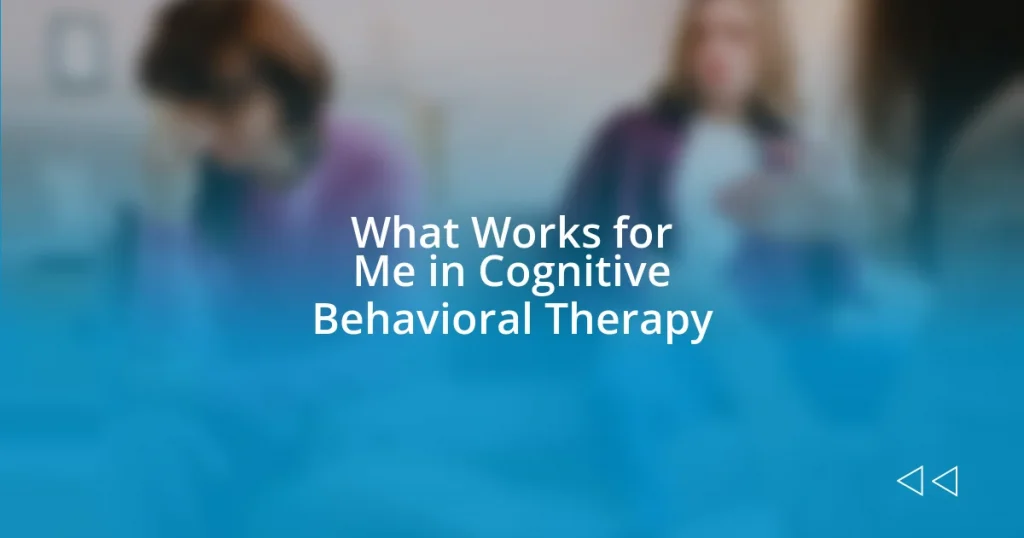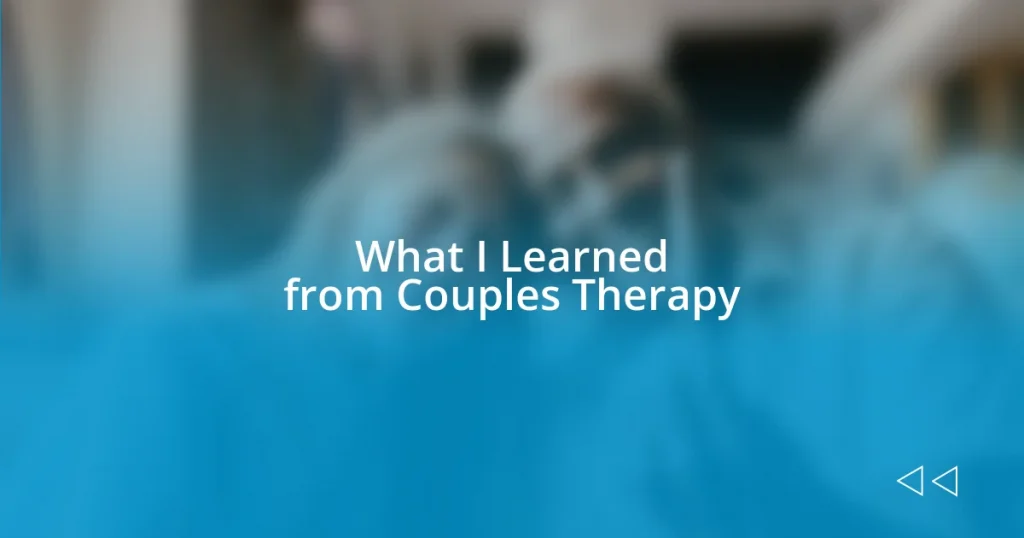Key takeaways:
- Group therapy provides a supportive environment that fosters emotional validation, diverse perspectives, and shared experiences, enhancing personal growth.
- Effective communication within the group improves through active listening and constructive feedback, allowing members to articulate their feelings and insights more clearly.
- Collaborative problem-solving and the development of coping strategies in group settings cultivate resilience and facilitate deeper connections among participants.
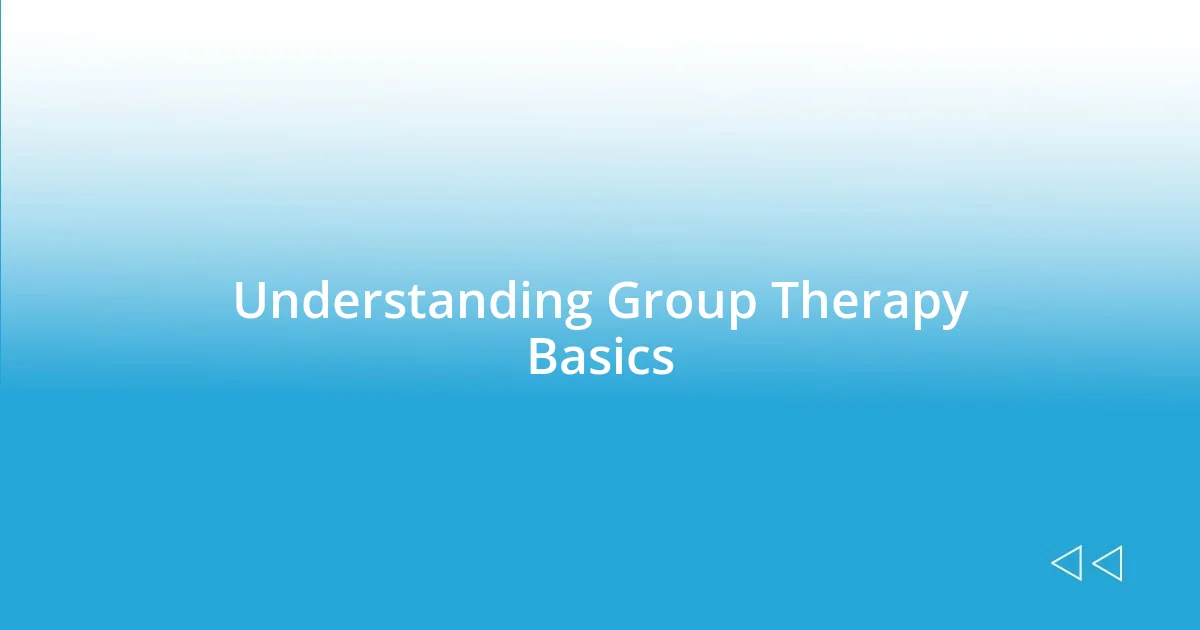
Understanding Group Therapy Basics
Group therapy is a powerful form of treatment where individuals come together to share their experiences and support one another. I remember my first session vividly; it was both daunting and exhilarating to be in a room full of strangers, each grappling with their own challenges. Have you ever felt that rush of relief when you realize you’re not alone in your struggles?
In these sessions, a trained therapist facilitates discussions, guiding the group through various topics. I found it fascinating how different perspectives can illuminate aspects of my own situation that I hadn’t considered before. Isn’t it incredible how others’ experiences can resonate with us in unexpected ways?
Each group can vary in size and structure, typically consisting of six to twelve members and focusing on specific issues like anxiety, depression, or grief. Reflecting on my journey, I discovered that the bond formed in these settings can lead to significant insights and personal growth. How often do we miss out on learning simply because we’re too hesitant to share our stories?
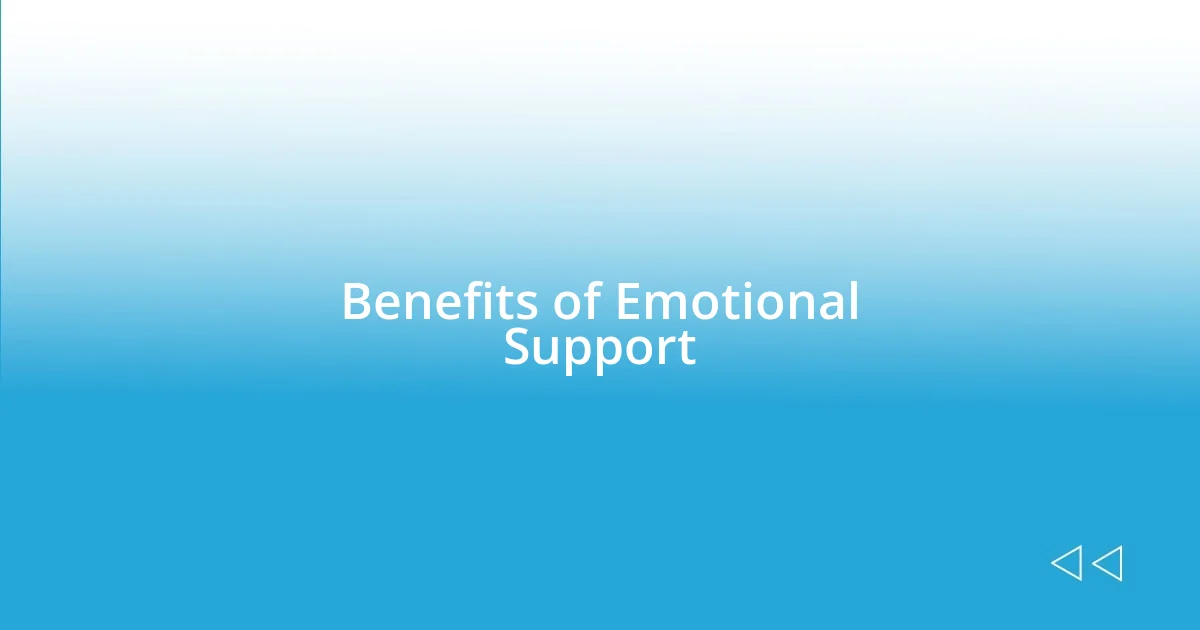
Benefits of Emotional Support
Emotional support serves as a cornerstone in group therapy, offering participants a sense of belonging and understanding. I remember feeling so uplifted when a fellow group member shared their story, and suddenly, I realized I wasn’t isolated in my feelings. This shared vulnerability fosters deep connections, often leading to breakthroughs that might not happen in solitary settings.
The benefits of emotional support in group therapy can be profound. Here are some key advantages:
- Validation: Participants often experience their feelings being validated, which can be incredibly reassuring.
- Shared Experiences: Hearing others’ stories makes you realize you aren’t alone in your struggles.
- Diverse Perspectives: Engaging with various viewpoints can broaden your understanding of your own challenges.
- Coping Skills: Group members often exchange ideas on coping mechanisms, enriching everyone’s toolkit for handling difficulties.
- Accountability: Emotional support encourages individuals to remain accountable in their journeys, motivating them to participate and progress.
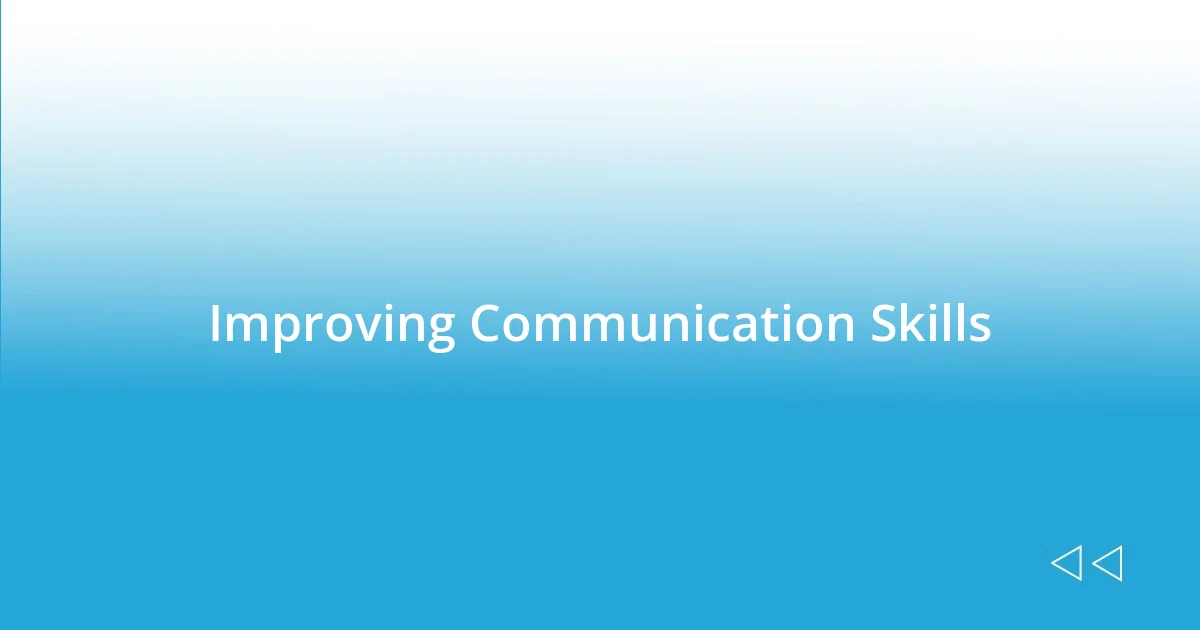
Improving Communication Skills
In group therapy, communication skills can dramatically improve as members learn to express their thoughts and feelings openly. I remember how, at first, I struggled to articulate my emotions. Yet, witnessing others share their experiences encouraged me to find my voice over time. Have you ever felt that hesitation to speak up, only to be inspired by someone’s bravery? It’s transformative.
One significant aspect of enhancing communication is the practice of active listening. In my sessions, I discovered that simply focusing on what others were saying led to deeper insights. As I actively listened, I found myself understanding different perspectives, which ultimately made it easier for me to articulate my own feelings. It’s amazing how listening can enhance not just your empathy but also your ability to contribute meaningfully to conversations.
Moreover, the feedback loop in group settings fosters growth. When I shared a concern, the responses from group members highlighted ways I could refine my communication. I often received constructive feedback that was gentle yet effective. This environment cultivates a brave space where everyone learns to express not only their struggles but also their triumphs, creating a rich tapestry of shared human experience.
| Communication Skills | Personal Experience |
|---|---|
| Expression | Gradually finding my voice was empowering. |
| Active Listening | Understanding different perspectives changed my own thought process. |
| Feedback Loop | Receiving constructive feedback helped refine my communication style. |
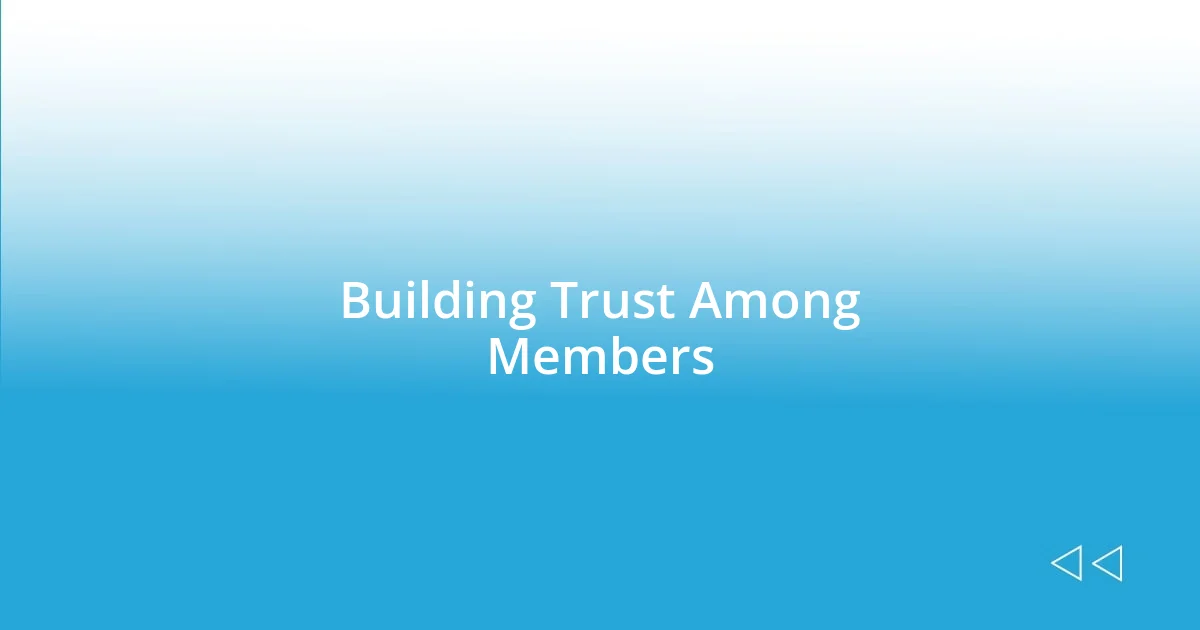
Building Trust Among Members
Building trust among members in group therapy is essential for creating a safe environment. I distinctly remember a time when a member took the brave step to share a deeply personal experience. That moment struck a chord in the room; it was like watching walls crumble. I found myself thinking, “If they can be vulnerable, so can I.” This collective courage ignited a flame of trust, allowing us all to feel comfortable enough to explore and express our innermost struggles.
As trust builds, members are more likely to engage authentically, which enhances the therapy’s effectiveness. I’ve witnessed how sharing feels like placing a puzzle piece on the table, gradually revealing a bigger picture of our experiences. That sense of belonging can be incredibly profound—it’s as if we’re all sailing on the same boat, navigating the choppy waters of life together. Isn’t it comforting to know you’re not battling your challenges alone?
When trust flourishes, the group can transform into a microcosm of support and understanding. I recall a time when a member felt completely discouraged and isolated. It was remarkable to see how the group rallied around them, offering encouragement and insights from their own journeys. That shared support not only uplifted the individual but also deepened our bonds. It made me realize that trust is not merely a feeling—it’s an active process that we collectively nurture, fostering an atmosphere where healing can truly take place.
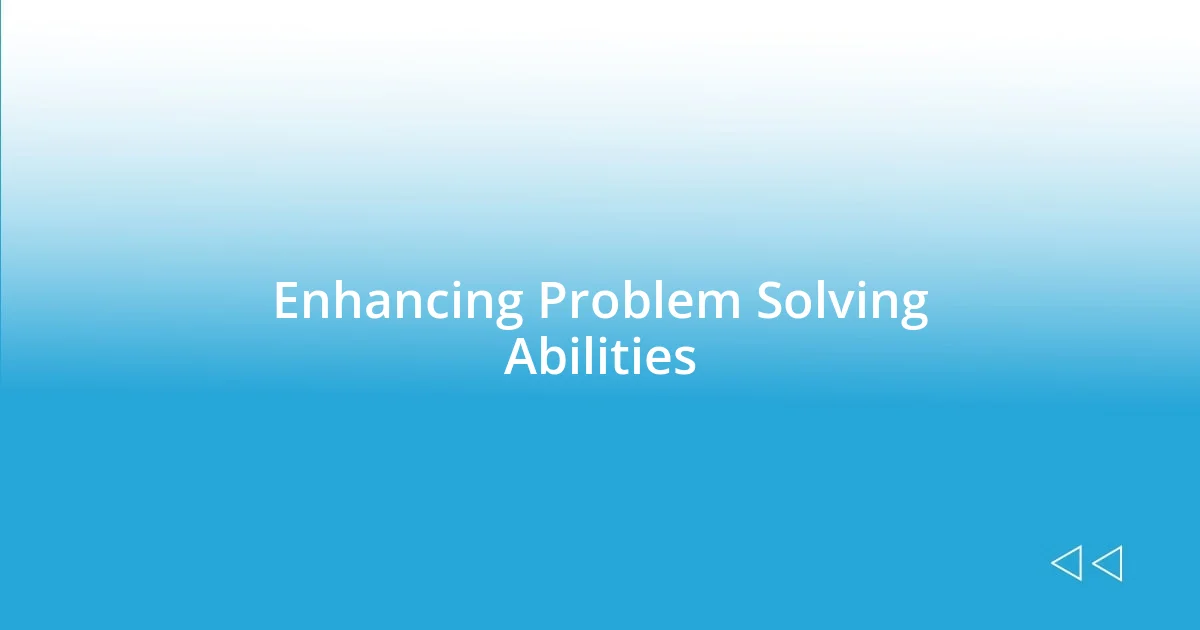
Enhancing Problem Solving Abilities
In group therapy, enhancing problem-solving abilities becomes a natural byproduct of collaborative dialogue. I remember a session where we faced a common issue—managing anxiety. Each member brought their unique experiences and solutions, creating a treasure trove of strategies. It was eye-opening to realize that different perspectives could unlock new approaches I hadn’t considered before. Have you ever found that a fresh viewpoint suddenly illuminates a path you thought was blocked?
There’s something powerful about brainstorming in a supportive group. I once shared a challenge related to work-life balance, feeling overwhelmed and unsure of how to proceed. As people offered their insights, I began connecting the dots between their suggestions and my situation. This process not only enriched my understanding but also provided me with actionable steps I could implement. It’s fascinating how exchanging ideas can turn into a collective brainstorming session that offers clarity and direction.
Moreover, when we engage in group exercises that focus on problem-solving, it’s as if we’re sharpening our mental tools. I distinctly recall a role-play activity that tackled conflict resolution. By stepping into different roles, I gained the ability to view a problem from various angles. Suddenly, what once felt insurmountable became manageable. Isn’t it incredible how immersing ourselves in different scenarios can equip us with the skills to handle real-life challenges more effectively?
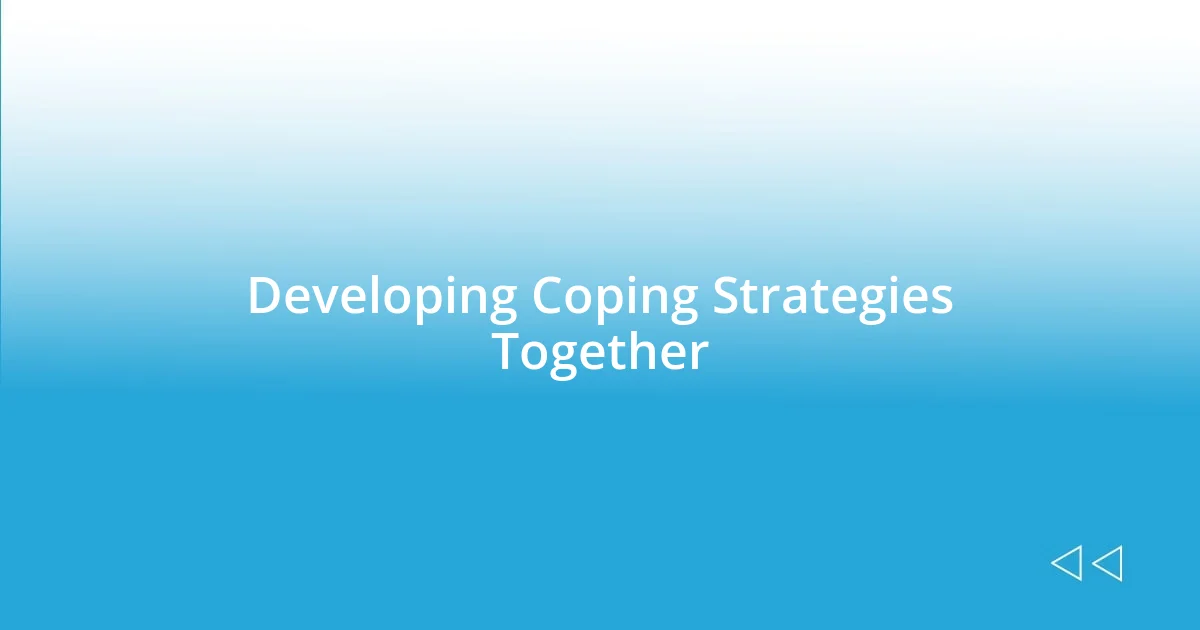
Developing Coping Strategies Together
Developing coping strategies together in group therapy is a unique experience that transforms isolation into solidarity. I recall one particular session where we shared our individual stressors, and someone suggested a simple but powerful breathing exercise. It was fascinating to see how this single idea resonated with many of us, sparking a conversation about mindfulness techniques that we could all try at home. Have you ever felt like a small suggestion suddenly opened the door to a wealth of possibilities?
As the group explored various coping mechanisms, I found myself surprised by the diversity of approaches. I listened intently to a member who swore by journaling as a way to process emotions. I discovered that incorporating writing into my own routine not only helped me reflect but also made me feel less alone in my thoughts. It’s amazing how sharing these strategies creates a tapestry of resilience we can all lean on.
Collaborating on coping strategies fosters a sense of shared ownership of our healing journeys. During one session, we divided into smaller groups to role-play and practice different stress-relief techniques. Through laughter and trial and error, I realized that mutual support not only strengthens our skills but also deepens our connections. I often wonder how our collective wisdom could guide someone grappling with their own struggles. Isn’t it extraordinary to think about how our shared experiences shape our resilience?
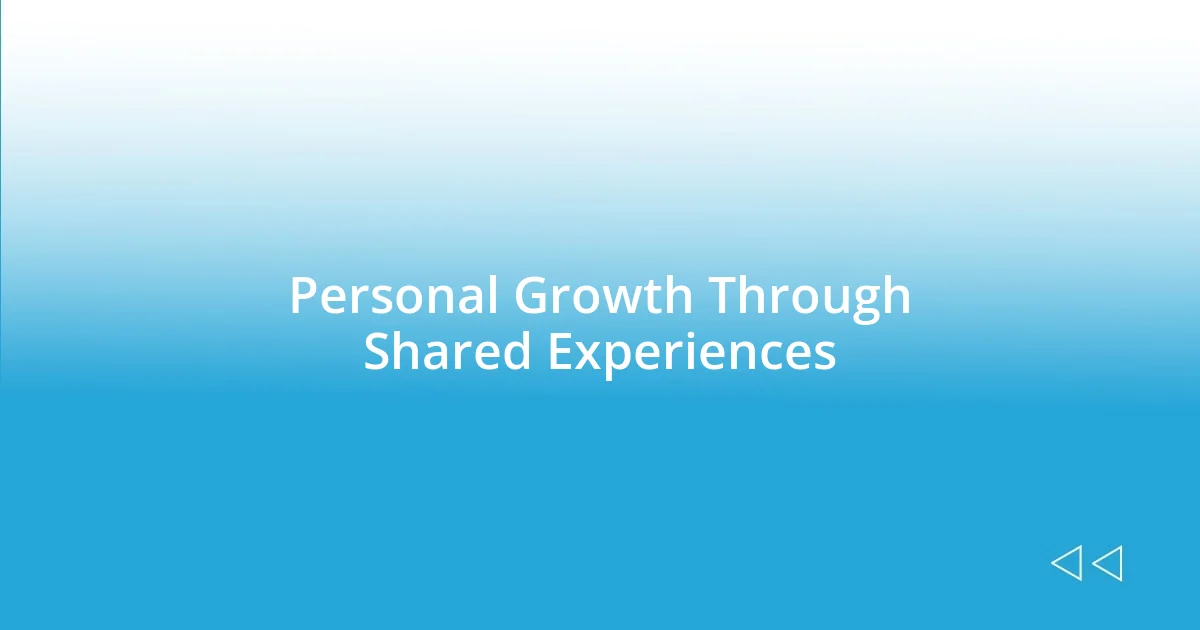
Personal Growth Through Shared Experiences
Personal growth often flourishes in the fertile ground of shared experiences. I vividly remember a time when we were discussing personal failures. One member shared their story of a job loss, and unexpectedly, it resonated deeply with me. Their honesty allowed me to confront my own fears of inadequacy, prompting me to reflect on my journey. How often do we stay silent about our struggles, only to find that someone else’s story empowers us to speak up?
During another session, we tackled the theme of vulnerability, which felt incredibly liberating. I shared my challenges with opening up emotionally, and to my surprise, multiple members echoed my sentiments. This moment reminded me that growth isn’t just about individual achievements; it thrives on the connections we build with one another. Isn’t it astounding how expressing our fears can bond us and, in turn, bolster our courage?
What strikes me most is the ripple effect of honesty. I once saw a fellow participant share how embracing their identity had been a long process filled with doubts. This courageous act inspired me to think critically about my own identity. It felt as if we were all mirrors, reflecting back the complexities we each carry. How can we truly grow without the courage to reveal our true selves to one another? The realization that we grow not in isolation but through our shared journeys is, quite frankly, uplifting.













